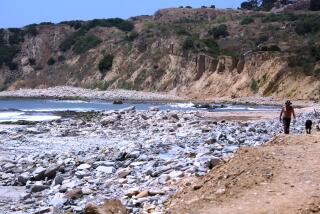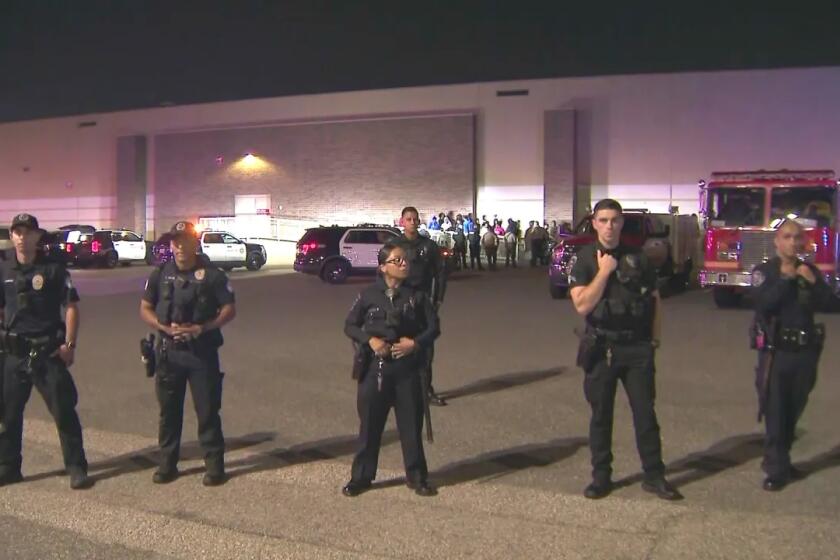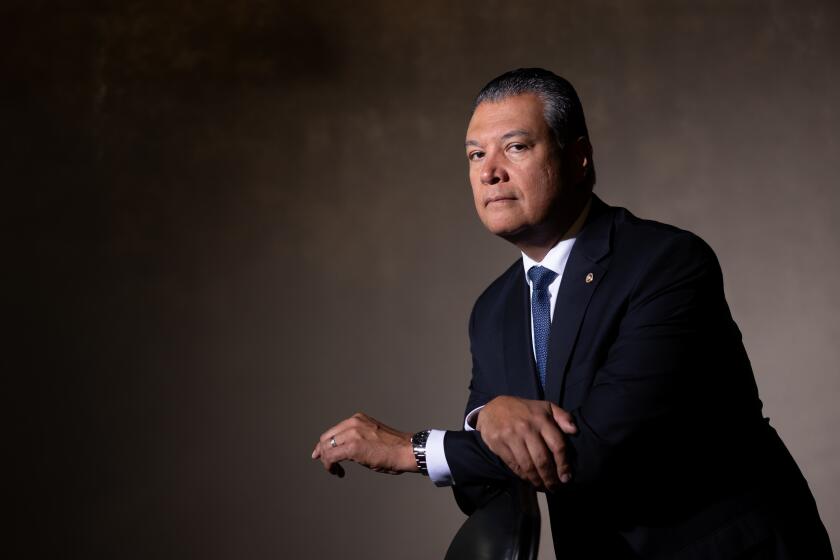Justices Hand L.A.’s Homeless a Victory
A federal appeals court ruled Friday that the Los Angeles Police Department cannot arrest people for sitting, lying or sleeping on public sidewalks on skid row, saying such enforcement amounts to cruel and unusual punishment because there are not enough shelter beds for the city’s huge homeless population.
The long-awaited decision effectively kills Los Angeles Police Chief William J. Bratton’s original blueprint for cleaning up skid row by removing homeless encampments that rise each evening throughout the 50-block downtown district. That plan has been on hold for three years, and city leaders have recently backed a less aggressive policy.
The ruling also has implications for police agencies around the nation that have grappled with how to deal with the homeless.
Although Los Angeles’ policy was considered one of the most restrictive in the nation, other communities have tried milder variations of the same approach. Las Vegas and Portland, Ore., for example, bar sleeping or standing on a sidewalk or other public space only if it obstructs pedestrians or cars, and Seattle, Tucson and Houston limit the hours of enforcement, the opinion said.
City officials said Friday that the ruling makes it likely that the LAPD will move forward with a more moderate skid row policing plan, one that would crack down on crime while allowing cardboard cities.
The city’s crackdown will focus “on the predators who are preying on the homeless, whether they are selling drugs, prostitution, whatever it is,” Mayor Antonio Villaraigosa, who has promised a major push to fix skid row, said Friday.
The mayor said he hoped the court’s decision would allow the city to finally move forward with a humane approach that targets crime without making criminals out of transients who have nowhere else to live.
Although the city attorney’s office would not say if it would appeal, the suit was filed two years before Villaraigosa’s election in 2005. The mayor has repeatedly said he wants a less contentious approach on the homeless issue, and recently appointed Ramona Ripston, executive director of the ACLU’s Southern California affiliate, to the city and county Homeless Services Authority. Only the city, as the defendant, can file an appeal.
The decision was issued by the U.S. 9th Circuit Court of Appeals in San Francisco, the most liberal federal appellate court in the nation.
“This will have a big impact not only on L.A. and regionally but also nationwide, as courts will be looking to this decision to determine whether the laws in their own communities are constitutional,” said Tulin Ozdeger, a staff attorney with the National Law Center on Homelessness & Poverty in Washington, D.C.
Mark Rosenbaum, legal director of the American Civil Liberties Union of Southern California and the lead attorney for the plaintiffs, said the ruling “stands for the proposition that in America, homelessness is not a crime.”
Bratton called for the removal of the tent cities when he arrived in Los Angeles in 2002, but the department scaled back its plans after the lawsuit was filed. Friday’s decision overturned a December 2004 ruling by U.S. District Judge Edward Rafeedie that held that the city’s enforcement was constitutional.
The suit was brought on behalf of six homeless people, including Robert Lee Purrie, who has lived in the skid row area for four decades and “sleeps on the streets because he cannot afford a room in an SRO hotel and is often unable to find an open bed in a shelter,” Judge Kim McLane Wardlaw wrote in the 2-1 majority opinion.
She said Purrie was cited for sleeping on the street on Dec. 5, 2002, and then again in the same location -- 6th and Towne -- on Jan. 14, 2003, when he was searched, handcuffed and arrested on a warrant for failing to pay the fine from his earlier citation.
“The police removed his property from his tent, broke it down, and threw all of his property, including the tent, into the street,” Wardlaw wrote. When he went back to the corner where he had been sleeping, all of his things, “including blankets, clothes, cooking utensils, a hygiene kit and other personal effects, were gone,” she added.
Purrie spent a night in jail, was given a 12-month suspended sentence and was ordered to pay $195 in restitution and attorney’s fees.
Wardlaw emphasized numerous studies documenting a large gap between the number of homeless in Los Angeles and the number of shelter beds.
Los Angeles’ skid row has the nation’s highest concentration of homeless individuals, with 11,000 to 12,000 living in the area bounded by 3rd, 7th, Main and Alameda streets, Wardlaw said in the opinion. She also noted that the National Coalition for the Homeless in 2004 named Los Angeles as one of the 20 “meanest” cities in the U.S. for the homeless.
Wardlaw said the disparity between shelter space and the number of homeless guaranteed that sitting, lying or sleeping on public sidewalks was “an unavoidable consequence of being human and homeless without shelter in the city of Los Angeles.”
Thus the city’s enforcement violated the 8th Amendment to the Constitution, which bars cruel and unusual punishment, she said, adding that prior Supreme Court rulings made it clear that the government “may not punish a person for who he is, independent of anything he has done.”
In a strongly worded dissent, Judge Pamela A. Rymer took issue with both the majority’s interpretation of the facts and its conclusion. The Los Angeles policy “does not punish people simply because they are homeless,” wrote Rymer, an appointee of former President Bush. “It targets conduct -- sitting, lying or sleeping on city sidewalks -- that can be committed by those with homes as well as those without.”
But Wardlaw, an appointee of former President Clinton, turned that argument around. “The city can secure a conviction under the ordinance against anyone who merely sits, lies or sleeps in a public way at any time of day.”
She also scoffed at Los Angeles officials’ contention that sleeping in the street was voluntary. “The city ... apparently believes that [the plaintiffs] can avoid sitting, lying and sleeping for days, weeks or months at a time to comply with the city’s ordinance, as if human beings could remain in perpetual motion. That being an impossibility, by criminalizing sitting, lying and sleeping, the city is in fact criminalizing [the plaintiffs’] status as homeless individuals,” Wardlaw wrote.
Edward C. Reed Jr., a federal trial judge from Nevada and an appointee of former President Carter, who was sitting with the court on special assignment, joined in the majority opinion.
The ruling comes as local leaders are making a new push to clean up skid row.
The county has proposed establishing suburban homeless centers to reduce the concentration of drug abuse centers and shelters in skid row. The mayor is expected to unveil his homeless plan soon.
In recent months, there has been growing consensus among Villaraigosa and downtown business leaders toward a more moderate approach suggested by George Kelling, a noted criminologist.
That plan would crack down on skid row’s drug trade and street crime but allow homeless encampments to remain. Bratton, who is weighing the Kelling plan against a more aggressive one proposed by Assistant Police Chief George Gascon, said recently that he would make his decision after this ruling.
The ruling won’t have an immediate effect because the city now allows homeless people to sleep on the street as long as they pack up their camps by morning. (The ACLU challenged only the city’s anti-sleeping law during nighttime hours, from 9 p.m. to 6:30 a.m. And Wardlaw agreed that the injunction covering those hours should go into effect).
It is very unusual for a plaintiff to win a case based on the 8th Amendment. In this instance, however, Wardlaw said the plaintiffs raised a meritorious issue, citing earlier rulings holding that the mere act of being a drug addict or an alcoholic is not a crime.
Erwin Chemerinsky, a professor of constitutional law at Duke University, said “the essential wisdom” of Friday’s ruling is that “in our society, you can’t make it a crime to be poor and homeless.”
He said the clashing views in the two opinions about who could be punished under the ordinance reminded him of a famous saying by the 19th century French writer Anatole France: “The law, in its majestic equality, forbids rich and poor alike to sleep under bridges, to beg in the streets, and to steal bread.”
More to Read
Start your day right
Sign up for Essential California for news, features and recommendations from the L.A. Times and beyond in your inbox six days a week.
You may occasionally receive promotional content from the Los Angeles Times.






